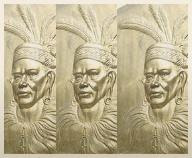
Sim Kwang Yang | Jan 3, 09 5:05pm
The banned entry of PKR MP N Gobalakrishnan into Sarawak on Christmas Eve has stirred up a mini-storm in both the Land of the Hornbills and the alternative media in West Malaysia.
Once again, the question on the mind of many Malaysians is this: why should a citizen require a passport or a permit to travel to a territory within the Federation of Malaysia?
To answer this question, we have to revisit the early days shortly before the formation of Malaysia in 1963.
It was a period of intense negotiations, fuelled by fear, confusion, and the imperative for the formation of Malaysia in view of the armed communist insurgency in Sarawak, the threat from the Indonesian Konfrontasi, and the recent armed revolt in Brunei led by Ahmad Azahari that spilled into Sarawak.
There were virulent voices in Sarawak against the Malaysian proposal then, mainly from the Sarawak Communist Party and their political front, the Sarawak United People’s Party (Supp). There was even talk of an alternative new political entity, to be composed of Sarawak, Brunei and the North Borneo Territory, later renamed Sabah.
For most pro-Malaysia political leaders in Sarawak, their greatest motivation was one of fear: the inability of the state to sustain itself on its own steam.
With a population of 800,000, and minuscule state revenue, how would Sarawak build its security forces to protect its territorial integrity? This Achilles’ heel had been made abundantly clear in those turbulent times of armed bloody conflicts in many parts of the state.
Another pull factor for these leaders was the successful land development programmes in Malaya at that time. It was thought at that time that if Sarawak joined Malaysia, the introduction of similar programmes would greatly help in the socio-economic development of this socio-economically backward state.
Then, another fear crept in. Some were worried that if the Sarawak immigration door was thrown open to the rest of the country, there would be a massive influx of West Malaysians, against whom, the yet-to-be-developed Sarawakians could not be able to compete.
Some kind of immigration safeguard was required to protect the interest of Sarawakians in the new federation of Malaysia.
Anti-Malaya resentment persisted today
This and other concerns have led to the signing of the Twenty Point Agreement that formed the basis of confederation of Malaysia, giving special, though limited, autonomy to Sarawak – and Sabah as well.
The sixth point of the Twenty Point Agreement states that:
“Control over immigration into any part of Malaysia from outside should rest with the central government but entry into Sarawak should also require the approval of the state government.
“The federal government should not be able to veto the entry of persons into Sarawak for state government purposes except on strictly security grounds. Sarawak should have unfettered control over the movements of persons other than those in federal government employ from other parts of Malaysia into Sarawak.”
In the 45 years since then, the socio-economic gap between East and West Malaysia has grown wider. The anti-Malaya resentment has persisted until this day.
When I first joined the DAP in 1978, the Chinese voters were told by SUPP not to support a West Malaysian party, a party from “outside”. It took over two decades of hard work, before the first DAP candidates were elected to the Sarawak state assembly.
Even today, I read on Dayak blogs calling for Sarawakians not to join the PKR because it is a political party from the “West”.
Most Sarawakians – including this writer – would support the continued existence of limited autonomy on matters of immigration in Sarawak. A case can perhaps be made for the abolition of such an apparent anomaly only after Sarawak has come to par in social economic development with the Klang Valley.
If it sounds parochial, it also has to be accepted that in a federation of states, regional peculiarity in politics is a fact of life. I should also mention in passing that English is still one of the languages spoken in the Sarawak State Assembly!
It’s an abuse of power
Having said all that, the declaration of Gobalakrishnan as a persona non grata does smack of abuse of power by the Sarawak state government in gaining unfair advantage over opposition parties in the state.
It did not come as a surprise, following the PKR announcement of making Sarawak and Sabah their frontline states amidst speculation of an early Sarawak state general election sometime this year.
PKR is the largest opposition party in the Parliament, and is one of the major partners in the ruling coalition in five peninsular states. Opposition Leader Anwar Ibrahim would become prime minister if he can seize the two jewels in the crown in East Malaysia.
If and when the hoards of the PKR army from West Malaysia descend upon Sarawak during a state general election, it is still to be seen whether the Sarawak BN can fight off such an assault.
Recently, Assistant Minister in the Chief Minister’s Department Daud Abdul Rahman said that the ban on Gobalakrishnan was an isolated incident, and that in the past, Anwar and Lim Kit Siang had been allowed entry without much ado.
But there have been numerous precedents of such politically motivated ban on entry into Sarawak in the past.
No entry to even Tengku Razaleigh
In 1978, when the DAP crossed the South China Sea and began setting up new branches in Sarawak, DAP national leaders then had been banned too from entering the state at immigration check point.
Lim Kit Siang, Lee Lam Thye, and Karpal Singh had all to be carried on a wheelchair onto the return flight to Kuala Lumpur at the Kuching airport. I should know; I was there 30 years ago at the Kuching International Airport to witness the farce, as the secretary of the newly-formed DAP Kuching branch.
During the 1991 general election in Sarawak, I was the DAP Sarawak state chairman. I had arranged for Tengku Razaleigh Hamzah, president of our then political partner Semangat 46, to campaign in some Malay constituencies.
Together with some other Semangat 46 luminaries, Razaleigh too was banned from entering Sarawak!
The latest victim of such a twisted ban has been Suaram director Dr Kua Kia Soong. He was making numerous trips to the interior of Sarawak on many fact-finding missions on the problems faced by the Sarawak indigenous communities. Apparently, his findings were deemed too unfavourable to the state government there.
The Sarawak BN ruling class has also consistently abused this power over immigration to reject local community activists their application for a passport to travel overseas.
Since the early 1990s, and especially after the Rio Earth Summit, Sarawakian NGO personnel and community leaders like Thomas Jalong of the SAM Marudi office, Jok Jau Evong of the Rumah Bawang Residential Association, Gara Jalong of the Long Geng Kenyah community, Raymand Abin of the Borneo Resource Institute (Brimas), Wong Meng Chuo of the Institute for Development and Alternative Living (Ideal) and others have all been denied their passports.
Likewise, NGO activists such as Chee Yok Lin of Sahabat Alam Malaysia (SAM) and Meenakshi Raman, (legal adviser of the Consumer’s Association of Penang) as well as several other NGO personnel from the Peninsular and Sabah are still refused entry into Sarawak.
Gobala ban not ‘isolated’ case
The original intention of the limited immigration autonomy bestowed on the Sarawak state government was meant to protect the socio-economic interests of Sarawakians.
But there has been a consistent trend in past decades for the Sarawak BN to abuse it to silence legitimate dissent from both within and without Sarawak. The declaration of the latest ban on a PKR MP as “isolated” is sheer humbug, balderdash, and nincompoop talk.
I am glad that Anwar has been appointed the head of the Sarawak and Sabah PKR.
The splintered and garrulous opposition forces will need a leader of his stature, tenacity, and resourcefulness to forge the widest possible rainbow alliance across ethnic, regional, religious, and party lines for a historic advance towards democracy and justice in these two dictatorial and backward states.
The way forward for Anwar in Sarawak will be fraught with traps, pitfalls, and quicksand.
One of these obstacles is the very real possibility that the state government there will declare him as yet another persona non grata.
In their desperation, the Sarawak BN leaders may even ban most of the Pakatan Rakyat leading lights from entering the state, including such well-known figures as Lim Guan Eng, Khalid Ibrahim and Nik Aziz Nik Mat. They are addicted in a compulsive manner to playing on an uneven field after all.
The PKR and the DAP lawyers in Sarawak would do well to dig out their statue books and law journal articles on this subject now. There must be a way of challenging the state government on their abuse of immigration powers.
At least, the ban on Gobalakrishnan should be filed in court to test the wisdom and the courage of the Borneo High Court.
Win or lose, such a court case would highlight how the Sarawak BN government has abused their control over immigration autonomy to protect their own interest rather than the interest of the Sarawak people.
It would indeed be a revealing statement on how fearful and desperate those Sarawak BN leaders are over the prospect of losing power in Sarawak.
About the Author: SIM KWANG YANG was Bandar Kuching MP from 1982-1995. He can be reached at kenyalang578@hotmail.com.




















